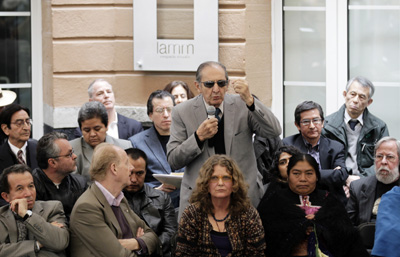The leading American author Russell Banks set the tone on Sunday as he stood among international writers and their local colleagues in Mexico City: “A nation’s journalists and writers, like its poets and story-tellers, are the eyes, ears, and mouths of the people. When journalists cannot freely speak of what they see and hear of the reality that surrounds them, the people cannot see, hear, or speak it either.” Banks is among the leaders of a high-level PEN International delegation that is meeting with top Mexican officials to pressure them to improve law enforcement in the murders of journalists, and to change the law to bring more cases under the federal government’s jurisdiction.
Mexican journalists are being killed at a terrible rate. Since December 2006, 43 journalists have been murdered or disappeared. In 13 of those cases, CPJ has established a clear connection between the victim’s journalism and their murder. The actual number may be higher. Often, it appears that those responsible for the murders are members of organized crime cartels that want to silence press coverage of what they are doing. In many cases, the murders come as organized groups take over a town or a region and move to control the press there. Sometimes, the bodies are found with notes from organized crime groups taking credit. The consequence of the murders–aside from the personal tragedies for the families–is that in a large and growing part of Mexico the press has simply stopped operating as journalists. Newspapers, radio, and TV are terrified to cover stories about crime and corruption because of threats from the cartels. These gangs, having taken over whole regions by corrupting civilian and police authorities, are making money through a vast network of criminal activities, from drug dealing to extortion.
This is what Banks was talking about: The press in these areas must now be blind and deaf, and so then is the public. Shortly after he spoke to the roughly 40 writers and journalists, Elena Poniatowska, the renowned Mexican author and journalist, put into a few words what it means to be a journalist in Mexico: “In Mexico, to tell the truth is to put your life on the line.”
Those two speakers put the problem well. But now there are two questions. First, how did things get this way? And then, what can be done? Both questions trace back to the federal government. It has not been able to effectively stop criminal cartels from invading and occupying large sections of the country, which means that the public and the journalists there are pretty much without protection, day to day. Then when a journalist is threatened, the federal government has not been able to safeguard them; or if they are killed, it has not been able to solve the case and punish the killers. In other words, there is impunity for threatening or killing journalists.
PEN hopes to eat away at that by undertaking an international campaign featuring famous writers, an effort designed to embarrass Mexico into doing more. The pressure began last Friday with a full page ad in a major national newspaper, El Universal, in support of Mexican journalists and writers. It was signed by 170 leading international writers, including winners of the Nobel Prize. It came on the day that the PEN delegation was meeting with the Mexican attorney general and the president of the Senate. There are other similar meetings set for this week, according to delegation officials.
John Ralston Saul, a Canadian author, is president of PEN International. He said the report on the mission will go out to PEN’s more than 100 chapters around the world. He didn’t use the word “warning” to describe how the group handled meetings with Mexican officials. Rather, he used the words, “cordial” and “polite.” But PEN’s warning to Mexico was hanging in the air. He told CPJ: “We stand in solidarity with our people, the people of the word. We are saying if you don’t do better, this is going to be a worldwide issue.”
